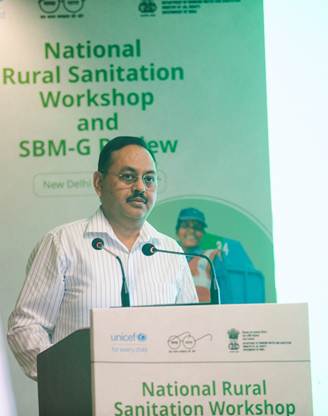Ministry of Jal Shakti
DDWS and UNICEF host the National Rural Sanitation Workshop that highlights the Next Phase of Inclusive, Resilient and Sustainable SBM-G
The High-level workshop organized by DDWS and UNICEF to plan the way forward of rural sanitation
New protocols launched for climate-resilient sanitation systems and safety of rural sanitation workers
Gram Panchayats take center stage as MoPR showcases grassroots sanitation leadership
Posted On:
02 JUL 2025 4:23PM by PIB Delhi
The Department of Drinking Water and Sanitation (DDWS), Ministry of Jal Shakti, and UNICEF India, organized the National Rural Sanitation Workshop today at the India Habitat Centre, New Delhi. The event brought together key stakeholders including senior government officials, state mission directors, development partners and sector experts to review the progress of the SBM-G and identify priorities for its next phase.

Delivering the Address, Secretary, DDWS, Shri Ashok KK Meena, said: “As we move forward on the SBM-G journey, we recognize that sanitation is not just about infrastructure, it is about dignity, equity and sustainability. This event and the launch of these protocols reflect the government’s commitment of leaving no one behind, while adapting to the climate challenges of our times. The next phase of SBM-G must continue to build on the collective momentum of the last decade and anchor local leadership in delivery.”

As part of the workshop, two important technical publications were released that represents an important step towards ensuring that sanitation services are not only safe and inclusive but also climate-resilient and equitable:
- Standard Operating Procedures for the Safety and Dignity of Sanitation Workers in Rural India
- Protocol for Developing Climate Resilient Sanitation Technical Designs and Services
The workshop opened with welcome remarks from UNICEF, Chief WASH & CCES, Karina Malczweska, who reiterated the need to transition from safe and inclusive sanitation to one that is resilient and future-ready, aligning with the broader goals of sustainable rural development.
Shri Kamal Kishore Soan, Additional Secretary and Mission Director, JJM &SBM-G, delivered the opening remarks and noted that the workshop is an important platform for reflection and recalibration. This meeting allows us to assess what we are doing and identify the areas that need our attention. The focus continues to be on ensuring pace and quality goes hand in hand. As climate risks intensify, integrating resilience into sanitation systems is no longer optional, it is essential. We are committed to supporting States with the tools, resources, and guidance they need to deliver.

Shri Sushil Kumar Lohani, Additional Secretary, Ministry of Panchayati Raj (MoPR), led a session on ‘Strengthening Panchayati Raj Institutions for Sustainable Sanitation’, highlighting the pivotal role of Gram Panchayats (GPs) in sustaining sanitation outcomes. With over 2.5 lakh Panchayats preparing thematic development plans using the e-GramSwaraj platform and tracking their performance through the Panchayat Advancement Index, local governance is increasingly becoming central to rural sanitation.
The session also emphasized the Clean and Green Panchayat initiative that empowers local bodies to lead in waste management, grey water reuse, and inclusive sanitation infrastructure—delivering visible outcomes aligned with the Sustainable Development Goals. Best practices from award-winning Gram Panchayats were showcased, including efforts in 100% waste segregation, large scale composting, eco-friendly practices, and safe sanitation.
The SBM-G review session provided a comprehensive snapshot of progress across States/UTs. Key highlights:
- 80% of targeted villages have achieved ODF Plus Model status, while only 54% have been verified.
- Grey water Management coverage has reached 91% nationally, with over 20 States/UTs crossing 95%
- Solid Waste Management coverage stands at 87%, while Plastic Waste Management has achieved 70% block-level coverage, though functionality remains an area of focus.
As the Swachh Bharat Mission completes a decade, the workshop reaffirmed the government's resolve to drive the next phase of SBM-G that is integrated and anchored in local leadership, enabled by climate smart innovation, and driven by sustainability. With convergence, monitoring, and behaviour change at the core, the mission continues its evolution toward a cleaner, healthier and more equitable rural India.
***
Dhanya Sanal K
(Release ID: 2141536)
Visitor Counter : 247